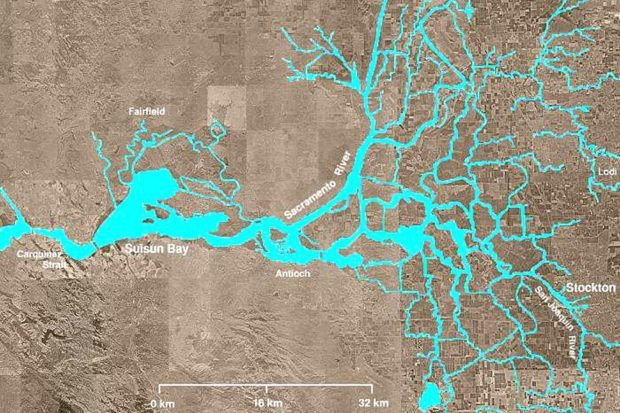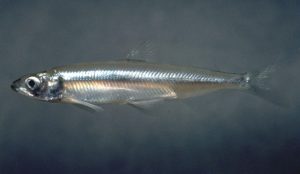
By Vic Bedoian
 The release of the long-anticipated Bay Delta Conservation Plan (BDCP) was greeted with rallies in Los Angeles, Santa Clara County and Sacramento by a coalition of groups opposing its major feature—giant tunnels designed to divert water under the Delta to farms in the Central Valley and southern California metropolitan areas.
The release of the long-anticipated Bay Delta Conservation Plan (BDCP) was greeted with rallies in Los Angeles, Santa Clara County and Sacramento by a coalition of groups opposing its major feature—giant tunnels designed to divert water under the Delta to farms in the Central Valley and southern California metropolitan areas.
Californians for a Fair Water Policy includes fishing organizations, environmental groups, Native American tribes, cities in the Delta region and Delta farmers. The broad coalition of groups promises to employ public pressure, lawsuits and a possible ballot measure to halt the BDCP. The plan is also contested by several state legislators and members of Congress.
If built, the BDCP would be one of the largest public works projects in the nation’s history. The draft Environmental Impact Report (EIR) was released online by the State of California on Dec. 9 with the federal Environmental Impact Statement (EIS) published on Dec. 13, beginning a 120-day period for public comment. The 30,000-page document details the environmental features of a plan promoted by Governor Jerry Brown and the State Resources Department as the best way to provide reliable water supplies for the state while restoring the Delta’s impaired ecosystem.
In addition to the twin tunnels, the BDCP would restore 153,000 acres of natural habitat in the Delta to enhance the ecosystem. These measures would improve fish habitat, protect natural plant and animal communities, enhance water channels and expand wetlands, grasslands and vernal pool complexes. Critics say it will forever damage the Delta’s ecology and fishery resources.
It took the state seven years to come up with the plan, but in all that time the officials have failed to win over the opponents. The centerpiece is a massive infrastructure of two tunnels, each 40 feet in diameter and 35 miles long, to carry Sacramento River water under the Delta and into the state’s water infrastructure heading south. The plan is projected to cost nearly $25 billion, but with debt service added in the actual price tag will be more than $50 billion.
In a press briefing before the official release, opponents previewed the plan and the flaws they see in it. Dr. Jeffrey Michael, director of the Business Forecasting Center at the University of Pacific, looked at the financial picture, “Since the BDCP process started back in 2006 and 2007, the construction cost estimates have increased from $4 billion to $15 billion, nearly a factor of four. The state just asked for another $1.2 billion just to complete planning and design over the next three years. That was supposed to cost $150 million. The total cost of planning is now up to $1.5 billion.”
According to water expert Lloyd Carter, San Joaquin Valley farmers who have been the driving force for the tunnel project are now in a bind, “The Westlands people have to make a very tough decision—are they going to spend $160 million in the next three years with no guarantee that the twin tunnel project can survive court challenges. They’re very edgy and very nervous.”
Dr. Michael said the plan won’t even be cost-effective for the farmers who stand to benefit most because, according to a study by Citigroup, the cost of building and financing the tunnels will amount to about a billion dollars a year. However, gross revenues from farming are pegged by the Bay Delta Plan at $134 million a year—only a fraction of their share of the project’s cost, “Agriculture is the problem. Agriculture is supposed to pay the majority of the costs because they receive a majority of the water. It is financially untenable for them.”
Residents of southern California’s metro areas are also supposed to benefit from the BDCP by receiving a more reliable water supply, although the amount of water they would get will not increase. Connor Everts is executive director of the Southern California Watershed Alliance. He stated that cities in the southland are already conserving and reducing their need for imported water.
“We’ve got agencies in San Diego that are down 30%‒40%, Los Angeles is down about 19% right now; our per capita has dropped across the region, and legally we’re all required to drop 20% by 2020. Long-range plans for places like the city of Los Angeles Department of Water and Power’s urban management plan to 2035 will have less reliance on imported water. In Santa Monica, where I live, we’re actually going for independence on imported water by 2020. We have groundwater so we can do that. We’ve cleaned up our groundwater; we’re enhancing our other programs.”
Numerous environmental and fishing organizations have been critical of the environmental impact the BDCP will have on the Delta’s ecology and endangered fish species. Bob Wright is senior counsel for Friends of the River. He minced no words in calling the plan a water grab and a fraud, “The federal agencies have failed to provide the written biological assessments and biological opinions addressing the effects of the water tunnels on the fish species and the designated critical habitat. The idea is that the public is supposed to have that information for reviewing the BDCP draft EIR/EIS. This omission is deliberate, it is intentional. We’ve been calling this to the attention both orally and in writing to the federal agencies.”

Wright predicts that ultimately federal environmental regulators will not approve the project because it violates the Endangered Species Act and other environmental laws.
Restore the Delta is an organization of several thousand people representing the Delta’s towns, farmers, recreational users and fishing groups. Executive Director Barbara Barrigan-Parilla contends the major beneficiaries of the plan will be large corporate growers in the Westlands Water District and the Kern County Water Agency, which account for only 0.3% of California’s economy.
She said urban water customers will foot most of the bill. “We’re being asked to sacrifice the greatest estuary on the west coast of the Americas, we’re being asked to sacrifice family farms that have been in existence for 150 years, we’re being asked to sacrifice the San Francisco Bay, we’re being asked to sacrifice upstream rivers and the water supply for millions of Californians—not to help households in other parts of the state but to continue shipping almonds and pistachios around the world.
“There’s enough water to share with our neighbors in southern California and the Santa Clara Valley, and we can do it in a much more cost-effective and sustainable manner than what is proposed in the BDCP.”
Delta advocates cited a recent University of Southern California poll showing only 36% of Californians would support the Delta plan with a $25 billion price tag. They promote reduced water exports, local conservation measures throughout the state and strengthening Delta levees as a better way to balance environmental protection while providing water for Californians.
*****
Vic Bedoian is an independent radio and print journalist working on environmental justice and natural resources issues in the San Joaquin Valley. Contact him at vicbedoian@gmail.com.
